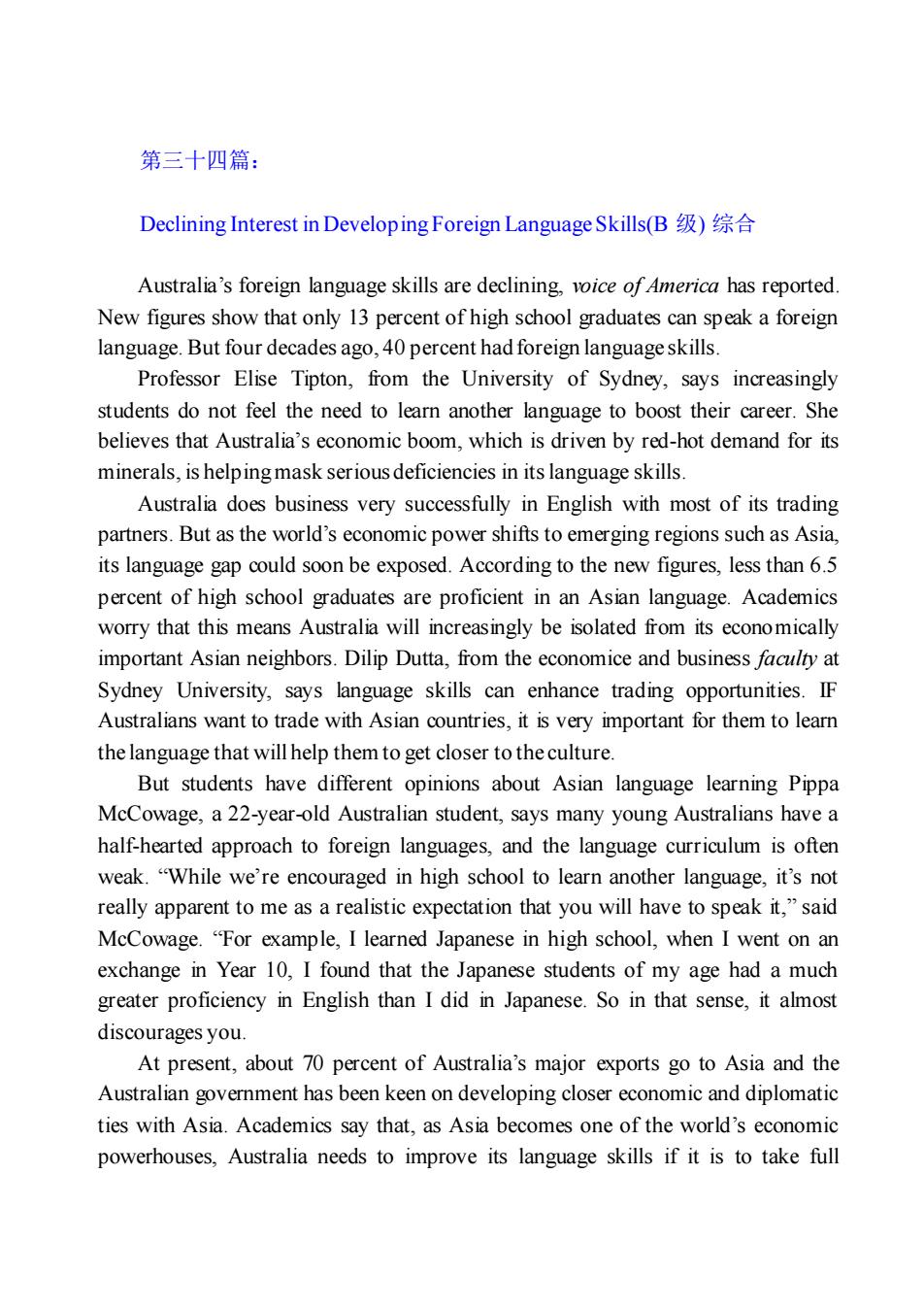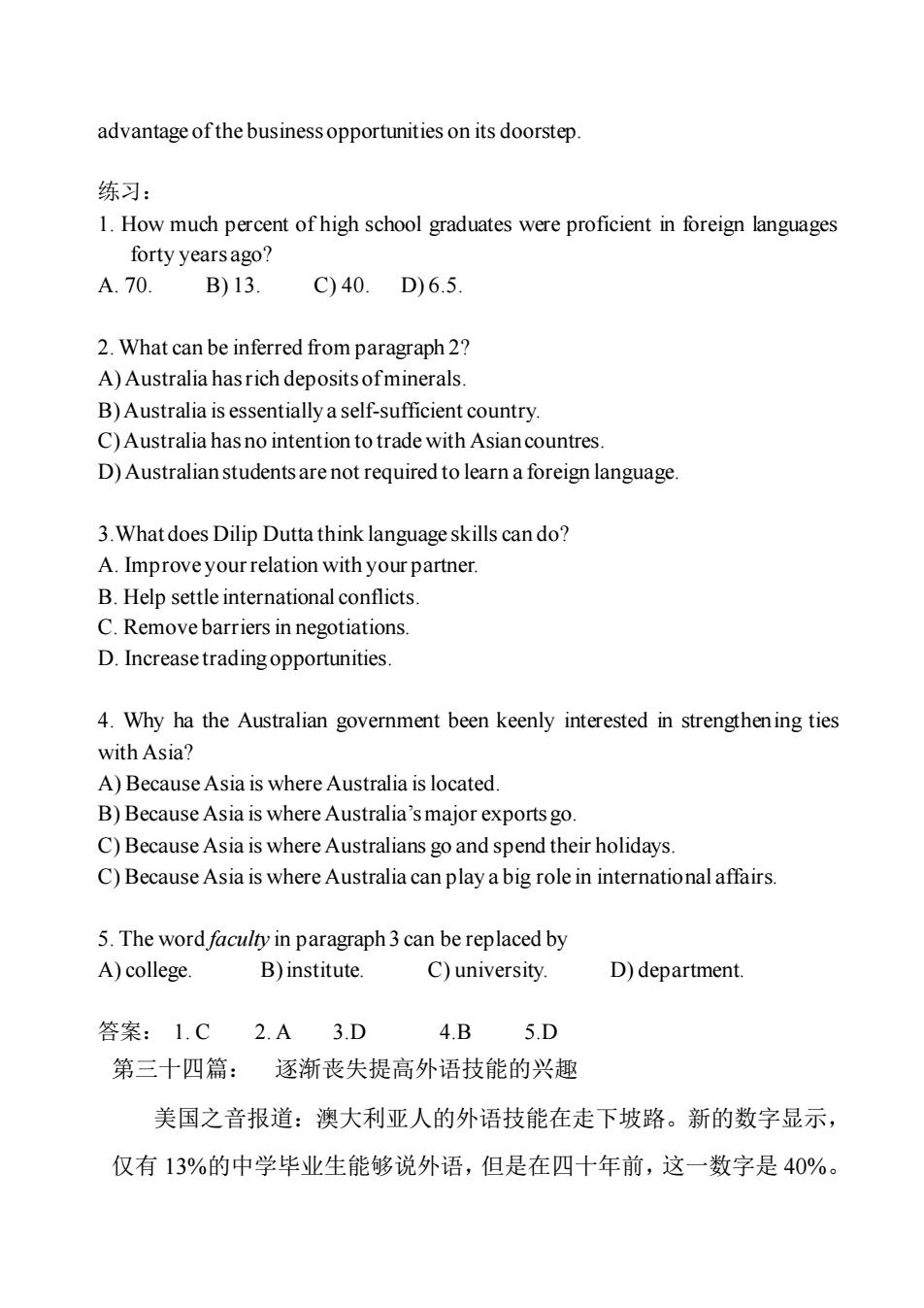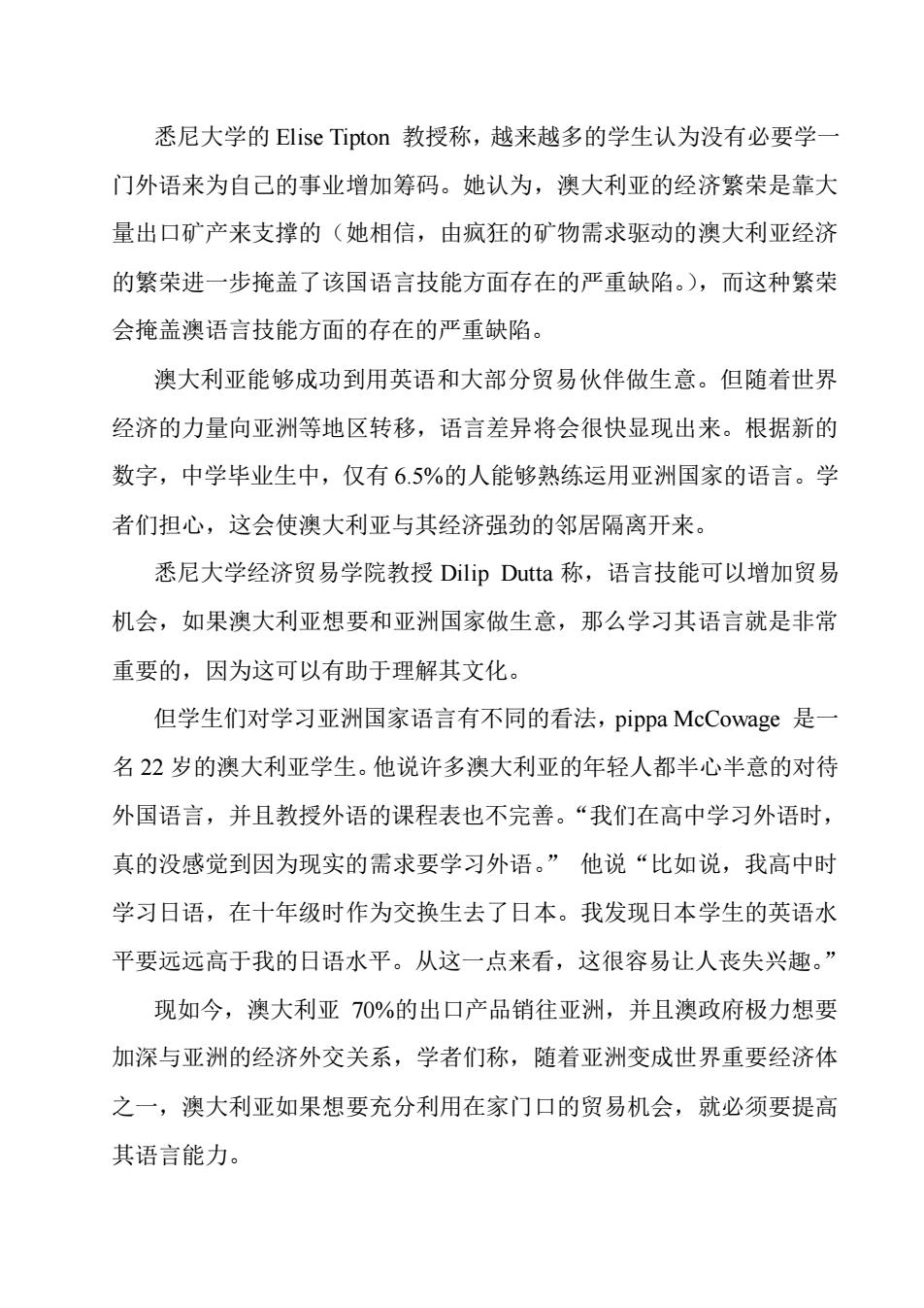
第三十四篇:DecliningInterest inDevelopingForeign LanguageSkills(B级)综合Australia's foreign language skills are declining, voice of America has reported.New figures show that only 13 percent of high school graduates can speak a foreignlanguage. But four decades ago, 40 percent had foreign language skills.Professor Elise Tipton, from the University of Sydney, says increasinglystudents do not feel the need to learn another language to boost their career. Shebelieves that Australia's economic boom, which is driven by red-hot demand for itsminerals, is helpingmask serious deficiencies in its language skills.Australia does business very successfully in English with most of its tradingpartners. But as the world's economic power shifts to emerging regions such as Asia,its language gap could soon be exposed. According to the new figures, less than 6.5percent of high school graduates are proficient in an Asian language. Academicsworry that this means Australia will increasingly be isolated from its economicallyimportant Asian neighbors. Dilip Dutta, from the economice and business faculty atSydney University, says language skills can enhance trading opportunities. IFAustralians want to trade with Asian countries, it is very important for them to learnthe language that will help them to get closer to the culture.But students have different opinions about Asian language learning PippaMcCowage, a 22-year-old Australian student, says many young Australians have ahalf-hearted approach to foreign languages, and the language curriculum is oftenweak.“While we're encouraged in high school to learn another language, it's notreally apparent to me as a realistic expectation that you will have to speak it," saidMcCowage. “For example, I learned Japanese in high school, when I went on anexchange in Year 10, I found that the Japanese students of my age had a muchgreater proficiency in English than I did in Japanese. So in that sense, it almostdiscouragesyou.At present, about 70 percent of Australia's major exports go to Asia and theAustralian government has been keen on developing closer economic and diplomaticties with Asia. Academics say that, as Asia becomes one of the world's economicpowerhouses, Australia needs to improve its language skills if it is to take full
第三十四篇: Declining Interest in Developing Foreign Language Skills(B 级) 综合 Australia’s foreign language skills are declining, voice of America has reported. New figures show that only 13 percent of high school graduates can speak a foreign language. But four decades ago, 40 percent had foreign language skills. Professor Elise Tipton, from the University of Sydney, says increasingly students do not feel the need to learn another language to boost their career. She believes that Australia’s economic boom, which is driven by red-hot demand for its minerals, is helping mask serious deficiencies in its language skills. Australia does business very successfully in English with most of its trading partners. But as the world’s economic power shifts to emerging regions such as Asia, its language gap could soon be exposed. According to the new figures, less than 6.5 percent of high school graduates are proficient in an Asian language. Academics worry that this means Australia will increasingly be isolated from its economically important Asian neighbors. Dilip Dutta, from the economice and business faculty at Sydney University, says language skills can enhance trading opportunities. IF Australians want to trade with Asian countries, it is very important for them to learn the language that will help them to get closer to the culture. But students have different opinions about Asian language learning Pippa McCowage, a 22-year-old Australian student, says many young Australians have a half-hearted approach to foreign languages, and the language curriculum is often weak. “While we’re encouraged in high school to learn another language, it’s not really apparent to me as a realistic expectation that you will have to speak it,” said McCowage. “For example, I learned Japanese in high school, when I went on an exchange in Year 10, I found that the Japanese students of my age had a much greater proficiency in English than I did in Japanese. So in that sense, it almost discourages you. At present, about 70 percent of Australia’s major exports go to Asia and the Australian government has been keen on developing closer economic and diplomatic ties with Asia. Academics say that, as Asia becomes one of the world’s economic powerhouses, Australia needs to improve its language skills if it is to take full

advantageofthebusinessopportunitiesonitsdoorstep练习:1. How much percent of high school graduates were proficient in foreign languagesforty years ago?A.70.B) 13.C) 40.D)6.5.2. What can be inferred from paragraph 2?A)Australia hasrichdepositsofmineralsB)Australia is essentially a self-sufficient country.C)Australia hasno intentiontotradewithAsiancountresD)Australian students arenotrequiredtolearn aforeign language3.What does Dilip Dutta think language skills can do?A.Improveyourrelationwithyourpartner.B. Help settle international conflictsC. Remove barriers in negotiations.D. Increase trading opportunities.4. Why ha the Australian government been keenly interested in strengthening tieswith Asia?A)BecauseAsia is where Australia is locatedB) Because Asia is where Australia's major exports go.C)BecauseAsia is whereAustralians goandspendtheirholidaysC)Because Asia is where Australia can play a big role in international affairs.5. The word faculty in paragraph3 can be replaced byA) college.B)institute.C)university.D) department.答案:1.C2.A3.D4.B 5.D第三十四篇:逐渐丧失提高外语技能的兴趣美国之音报道:澳大利亚人的外语技能在走下坡路。新的数字显示,仅有13%的中学毕业生能够说外语,但是在四十年前,这一数字是40%
advantage of the business opportunities on its doorstep. 练习: 1. How much percent of high school graduates were proficient in foreign languages forty years ago? A. 70. B) 13. C) 40. D) 6.5. 2. What can be inferred from paragraph 2? A) Australia has rich deposits of minerals. B) Australia is essentially a self-sufficient country. C) Australia has no intention to trade with Asian countres. D) Australian students are not required to learn a foreign language. 3.What does Dilip Dutta think language skills can do? A. Improve your relation with your partner. B. Help settle international conflicts. C. Remove barriers in negotiations. D. Increase trading opportunities. 4. Why ha the Australian government been keenly interested in strengthening ties with Asia? A) Because Asia is where Australia is located. B) Because Asia is where Australia’s major exports go. C) Because Asia is where Australians go and spend their holidays. C) Because Asia is where Australia can play a big role in international affairs. 5. The word faculty in paragraph 3 can be replaced by A) college. B) institute. C) university. D) department. 答案: 1. C 2. A 3.D 4.B 5.D 第三十四篇: 逐渐丧失提高外语技能的兴趣 美国之音报道:澳大利亚人的外语技能在走下坡路。新的数字显示, 仅有 13%的中学毕业生能够说外语,但是在四十年前,这一数字是 40%

悉尼大学的EliseTipton教授称,越来越多的学生认为没有必要学一门外语来为自已的事业增加筹码。她认为,澳大利亚的经济繁荣是靠大量出口矿产来支撑的(她相信,由疯狂的矿物需求驱动的澳大利亚经济的繁荣进一步掩盖了该国语言技能方面存在的严重缺陷。),而这种繁荣会掩盖澳语言技能方面的存在的严重缺陷。澳大利亚能够成功到用英语和大部分贸易伙伴做生意。但随着世界经济的力量向亚洲等地区转移,语言差异将会很快显现出来。根据新的数字,中学毕业生中,仅有6.5%的人能够熟练运用亚洲国家的语言。学者们担心,这会使澳大利亚与其经济强劲的邻居隔离开来。悉尼大学经济贸易学院教授DilipDutta称,语言技能可以增加贸易机会,如果澳大利亚想要和亚洲国家做生意,那么学习其语言就是非常重要的,因为这可以有助于理解其文化。但学生们对学习亚洲国家语言有不同的看法,pippaMcCowage是一名22岁的澳大利亚学生。他说许多澳大利亚的年轻人都半心半意的对待外国语言,并且教授外语的课程表也不完善。“我们在高中学习外语时,真的没感觉到因为现实的需求要学习外语。”他说“比如说,我高中时学习日语,在十年级时作为交换生去了日本。我发现日本学生的英语水平要远远高于我的日语水平。从这一点来看,这很容易让人丧失兴趣。”现如今,澳大利亚70%的出口产品销往亚洲,并且澳政府极力想要加深与亚洲的经济外交关系,学者们称,随着亚洲变成世界重要经济体之一,澳大利亚如果想要充分利用在家门口的贸易机会,就必须要提高其语言能力
悉尼大学的 Elise Tipton 教授称,越来越多的学生认为没有必要学一 门外语来为自己的事业增加筹码。她认为,澳大利亚的经济繁荣是靠大 量出口矿产来支撑的(她相信,由疯狂的矿物需求驱动的澳大利亚经济 的繁荣进一步掩盖了该国语言技能方面存在的严重缺陷。),而这种繁荣 会掩盖澳语言技能方面的存在的严重缺陷。 澳大利亚能够成功到用英语和大部分贸易伙伴做生意。但随着世界 经济的力量向亚洲等地区转移,语言差异将会很快显现出来。根据新的 数字,中学毕业生中,仅有 6.5%的人能够熟练运用亚洲国家的语言。学 者们担心,这会使澳大利亚与其经济强劲的邻居隔离开来。 悉尼大学经济贸易学院教授 Dilip Dutta 称,语言技能可以增加贸易 机会,如果澳大利亚想要和亚洲国家做生意,那么学习其语言就是非常 重要的,因为这可以有助于理解其文化。 但学生们对学习亚洲国家语言有不同的看法,pippa McCowage 是一 名 22 岁的澳大利亚学生。他说许多澳大利亚的年轻人都半心半意的对待 外国语言,并且教授外语的课程表也不完善。“我们在高中学习外语时, 真的没感觉到因为现实的需求要学习外语。” 他说“比如说,我高中时 学习日语,在十年级时作为交换生去了日本。我发现日本学生的英语水 平要远远高于我的日语水平。从这一点来看,这很容易让人丧失兴趣。” 现如今,澳大利亚 70%的出口产品销往亚洲,并且澳政府极力想要 加深与亚洲的经济外交关系,学者们称,随着亚洲变成世界重要经济体 之一,澳大利亚如果想要充分利用在家门口的贸易机会,就必须要提高 其语言能力